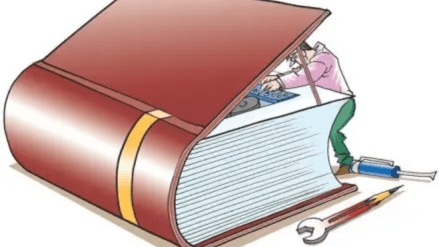By Srinath Sridharan
A pandemic, with its widespread school closures, brought school education to the forefront of public consciousness. Though we then worried about the impacts of the pandemic, stepping back reveals that the system was already in crisis, much before Covid. India’s learning poverty rate (the percentage of 10-year-olds unable to read a basic text), which hit 70% after the pandemic, was already unacceptably high at 55% even as late as 2019.
Why are India’s schools failing to deliver quality despite billions in funding? We can start by looking at global best practices—the World Bank’s 2022 ‘Guide on Learning Recovery’ recommends an approach called ‘RAPID’: Reach every child and keep them in school, assess learning levels regularly, Prioritize teaching the fundamentals, Increase the efficiency of instruction, and develop psychosocial health and wellbeing. Holding up India’s system against this framework makes it uncomfortably clear that despite or even if keeping children in school, it falls short on all quality indicators. We can no longer ignore that the very system meant to empower our children is stifling their future with a glaring lack of accountability and a misplaced focus on inputs over outcomes.
Building a system-wide focus on quality is key
Public schools, which do not charge fees, lack the accountability of buyer-seller relationships and have little incentive to improve quality. Meanwhile, private schools are ensnared in red tape, forced to comply with regulations that focus disproportionately on procedural minutiae, such as land requirements or teacher qualifications, while neglecting the critical issue of student learning outcomes. The sector is starved of desperately needed innovation and investment despite virtually no regulation on quality—a national shame that demands urgent redress.
The proposed solution lies in learning from successful regulatory models. The sector suffers from a classic governance challenge—the principal-agent problem—encapsulated in Chanakya’s timeless observation, “Just as fish moving under water cannot possibly be found out either as drinking or not drinking water, so government servants cannot be found out while taking money for themselves.” Since it is nearly impossible to rely solely on the honesty of individuals for public good, industries with significant impact on public welfare operate under the eyes of watchdogs. These institutions are essential safeguards that step in when systems falter. For instance, following the 1990 balance of payments crisis, the Reserve Bank of India revitalised its regulatory approach and paved the way for economic liberalisation and sustained growth. Unfortunately, education quality, that holds the key to shaping the future of India’s citizens—and the nation’s developmental objective —remains critically under-regulated.
An independent regulatory agency focused on school quality rating—such as the State School Standards Authority (SSSA) described in the National Education Policy (NEP) 2020—could be transformative.
Regulation must be consistent, transparent, and linked to financial incentives
By ensuring consistent standards for public and private schools and transparent disclosure of learning outcomes, the SSSA could rectify the imbalance in the current approach and reduce the information asymmetry that disadvantages parents. India can learn from Chile’s Agencia de la Calidad de la Educación. By regularly assessing and disclosing school performance, it has empowered parents to choose their best option, driving innovation and improving learning outcomes.
Transparency alone is insufficient to create tangible motivation for improvement. The NEP’s proposal to link the SSSA’s evaluations to financial allocations by bodies like the Finance Commission is a step in the right direction. The 15th Finance Commission has recommended a grant of ₹4,800 crore for states to improve educational outcomes. Linking this to the SSSA’s reports could create a powerful feedback loop, giving states a strong motivation to prioritise school performance.
Implementing it right—an agile and autonomous SSSA
Setting up an independent SSSA would shift school regulation out of the Department of Education, freeing up capacity to focus on its core responsibility: operating and improving public schools. At the same time, an agile and specialised SSSA could prioritise low-cost, high-impact solutions and build a streamlined governance structure.
India’s robust digital infrastructure makes this achievable. The Aadhaar-enabled UIDAI system can map students to schools, ensuring accurate, duplication-free data. Platforms like India’s National Digital Educational Architecture (NDEAR) can generate predictive insights. Data-driven oversight would reduce the compliance burden on schools, allowing them to focus on teaching.
The real challenge lies in the SSSA’s ability to remain unbiased. Some states have designated existing government bodies as the SSSA, compromising its autonomy. We cannot afford for this envisaged regulator to become a cushy post for retired bureaucrats, judges, or political benefactors. Without genuine independence and integrity, the SSSA risks becoming another vehicle for vested interests.
A robust regulatory framework, complemented by transparent ratings and performance-linked incentives, is an overdue need. India must shift from outdated input-based metrics to the measure that truly matters: learning outcomes. Critics may argue that such reforms could be disruptive or impose additional burdens but let us be clear: the notion that public education is an altruistic tool is nothing but a facade, while private education has been turned into a cash cow.
Education has the potential to build a nation, but when governed by vested interests, it builds walls between privilege and potential. Our children deserve better, and our nation’s future depends on i
The author is a Corporate Advisor and Independent director of Corporate Boards
Disclaimer: Views expressed are personal and do not reflect the official position or policy of FinancialExpress.com. Reproducing this content without permission is prohibited.
